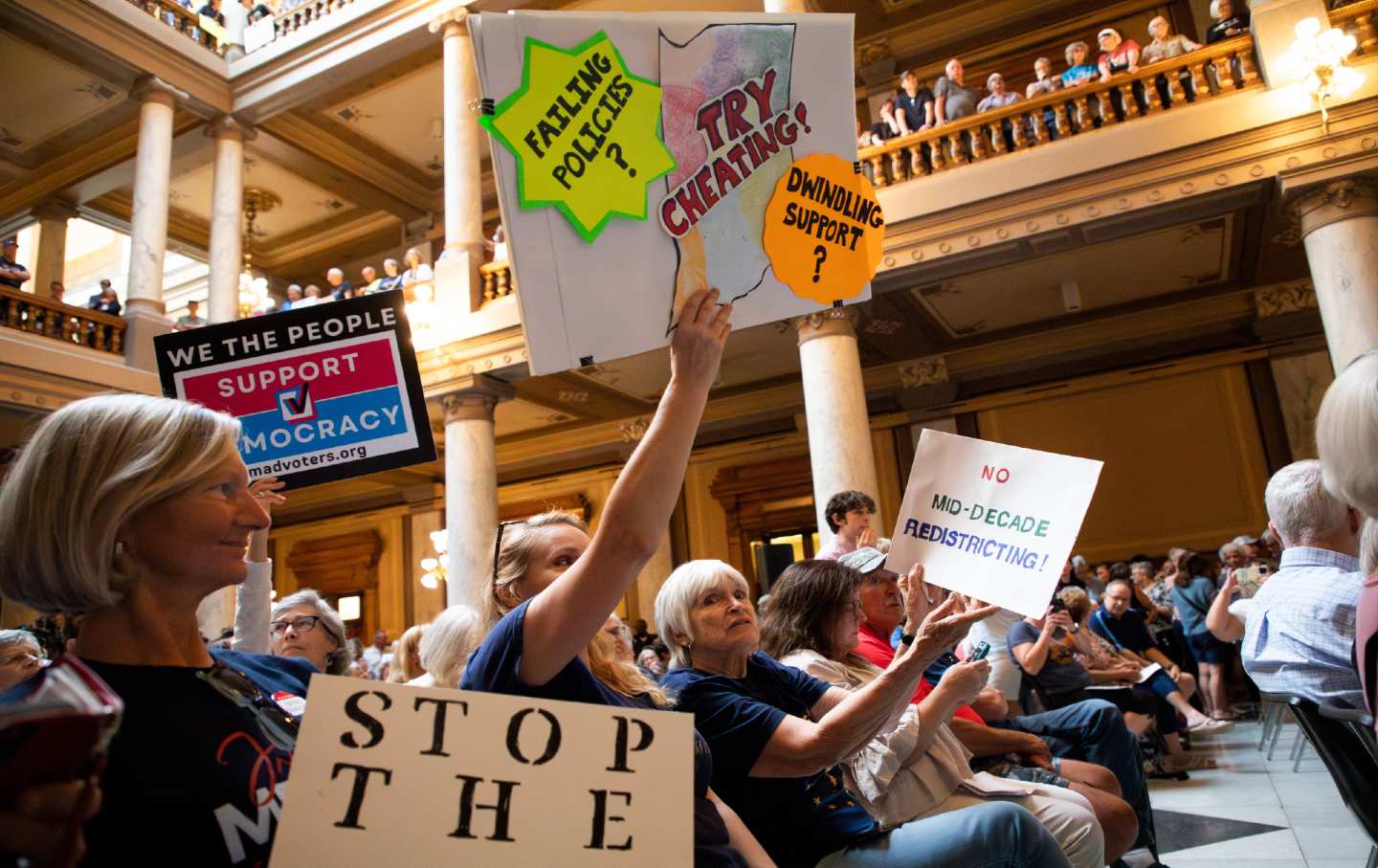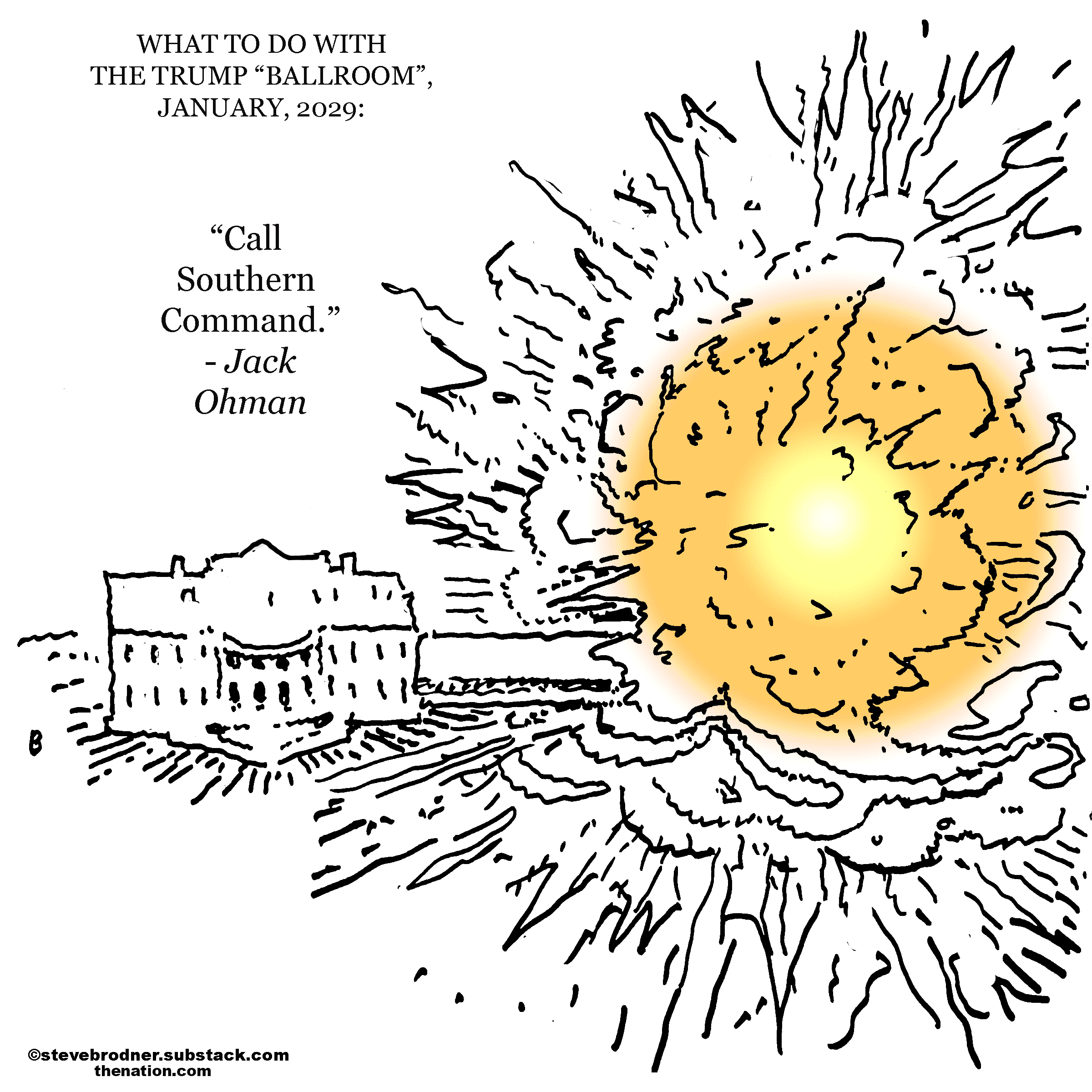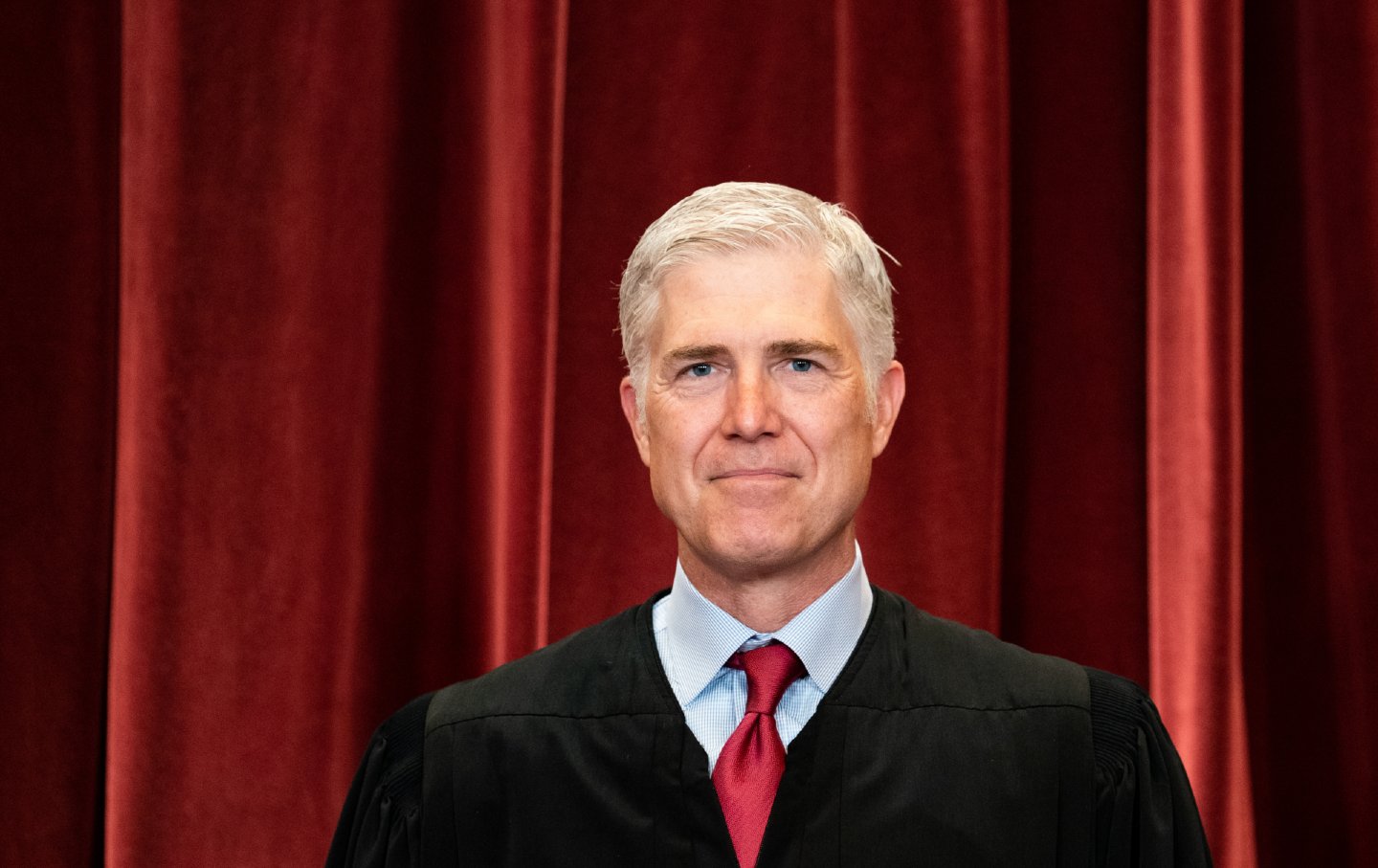The Supreme Court Could Soon Let Trump Buy All the Guns He Wants
Trump is currently prohibited from buying guns because he’s under criminal indictment. But two big court cases could change that.

Donald Trump poses for a picture at a South Carolina gun store.
(Daily Telegraph screenshot)While making a campaign stop at a South Carolina gun store on Monday, former president Donald Trump, who is currently facing 91 federal and state indictments, apparently bought a Glock handgun with his face emblazoned on it.
I say “apparently” because video of him at the store only shows Trump making an offhand inquiry about buying the gun. Adding to the confusion, while the video was initially posted by Trump campaign spokesperson Steven Cheung with the caption “President Trump purchases a @GlockINC in South Carolina!” Cheung later deleted his tweet and the campaign told reporters that no gun had actually been bought.
From a political perspective, one can see why Trump’s team would want to suggest that Trump is packing, regardless of whether or not he actually bought the gaudy hand-cannon (or whether the campaign is telling journalists he didn’t, since the MAGA mob never believes journalists anyway). But I’m skeptical that Trump bought the gun because… he can’t. Trump is under numerous federal indictments, and current federal law prohibits such individuals from purchasing firearms.
However, that law is under direct attack by Republican judges through the federal judiciary, and the conservative legal-industrial complex. Trump can’t buy a gun today without catching (yet another) criminal indictment, but if he waits until next June, he, and every indicted person in the country, might well have an opportunity to arm themselves for whatever reasons they deem fit.
The case that puts this prohibition into question is called US v. Quiroz. The defendant in the case, Jose Gomez Quiroz, purchased an M1911 .22 caliber semiautomatic handgun while he was under federal indictment for burglary. He was convicted for the illegal purchase but challenged the verdict, saying that it violated his Second Amendment rights. US District Judge David Counts, a Trump appointee, ruled in favor of Quiroz. Counts said that in light of the Supreme Court’s decision in New York State Rifle & Pistol Association v. Bruen (which ruled that even gun registration was a violation of the Second Amendment), the federal government no longer had the authority to restrict gun sales to those under indictment.
The Quiroz case is up for appeal at the US Court of Appeals for the Fifth Circuit, the most rabidly conservative court in the country. The Fifth Circuit could easily uphold Counts’s ruling. If it does, that case will almost certainly be appealed to the Supreme Court.
But Trump likely won’t even have to wait that long if he desperately wants to get his tiny hands on a compensation device. That’s because the Supreme Court is already scheduled to hear a separate case called US v. Rahimi, on November 7 of this year. That case is slightly different from the Quiroz case. There, the defendant, Zachary Rahimi, was under a restraining order for domestic abuse. Federal law also prohibits people under restraining orders from buying guns. Rahimi challenged the law, again under the Second Amendment. The Fifth Circuit ruled in his favor, and now the Supreme Court will weigh in.
The progressive in me is contractually obligated to tell you that Quiroz—and, if he wants to test these laws, Donald Trump—has a stronger case than Rahimi. A restraining order is not a mere accusation: It is a ruling issued by a judge and comes with all the due process rights associated with a legal adjudication. In contrast, an indictment is just a charge. I could argue that people shouldn’t have fundamental rights taken away from them based on a mere accusation from the government.
Of course, when I think of “fundamental rights,” I think of the right to vote and participate in democracy. I don’t think of the right to murder people who are bothering you as one of our most critical rights, and I do not think that the Constitution is a murder-suicide pact. Keeping guns out of the hands of felons or potential felons is a wise and safe policy goal that would be easy to achieve in a less violent country than ours. But I’m not a Republican. For conservatives, the Constitution consists of the sacrosanct Second Amendment and then a bunch of suggestions.
The Supreme Court could well uphold Rahimi’s right to bear arms to menace his ex-girlfriends. And if the court rules for him in a sweeping fashion, it will likely do so in a way that benefits Quiroz as well. The next phase of the conservative plan to turn America into a post-apocalyptic hellscape seems to be to rearm anybody who has had their guns taken away because of their actions or crimes.
The upshot is this: If Trump did buy a gun in South Carolina, it’s just another crime he will likely get away with. I guess I would encourage people to wear bulletproof vests on Fifth Avenue next summer, because the Supreme Court could soon make it a whole lot easier for Trump to test out his theories about whom he can shoot without consequences.
Disobey authoritarians, support The Nation
Over the past year you’ve read Nation writers like Elie Mystal, Kaveh Akbar, John Nichols, Joan Walsh, Bryce Covert, Dave Zirin, Jeet Heer, Michael T. Klare, Katha Pollitt, Amy Littlefield, Gregg Gonsalves, and Sasha Abramsky take on the Trump family’s corruption, set the record straight about Robert F. Kennedy Jr.’s catastrophic Make America Healthy Again movement, survey the fallout and human cost of the DOGE wrecking ball, anticipate the Supreme Court’s dangerous antidemocratic rulings, and amplify successful tactics of resistance on the streets and in Congress.
We publish these stories because when members of our communities are being abducted, household debt is climbing, and AI data centers are causing water and electricity shortages, we have a duty as journalists to do all we can to inform the public.
In 2026, our aim is to do more than ever before—but we need your support to make that happen.
Through December 31, a generous donor will match all donations up to $75,000. That means that your contribution will be doubled, dollar for dollar. If we hit the full match, we’ll be starting 2026 with $150,000 to invest in the stories that impact real people’s lives—the kinds of stories that billionaire-owned, corporate-backed outlets aren’t covering.
With your support, our team will publish major stories that the president and his allies won’t want you to read. We’ll cover the emerging military-tech industrial complex and matters of war, peace, and surveillance, as well as the affordability crisis, hunger, housing, healthcare, the environment, attacks on reproductive rights, and much more. At the same time, we’ll imagine alternatives to Trumpian rule and uplift efforts to create a better world, here and now.
While your gift has twice the impact, I’m asking you to support The Nation with a donation today. You’ll empower the journalists, editors, and fact-checkers best equipped to hold this authoritarian administration to account.
I hope you won’t miss this moment—donate to The Nation today.
Onward,
Katrina vanden Heuvel
Editor and publisher, The Nation
More from The Nation

Indiana’s Gerrymander Victory Won’t Save Us Indiana’s Gerrymander Victory Won’t Save Us
The Hoosier State’s Senate showed rare backbone in resisting the Trump White House’s demand for a mid-cycle gerrymander. But the Roberts court gets the final say.

Blind to Brutality: The Palestinian Death Toll Surpasses 70,000 Blind to Brutality: The Palestinian Death Toll Surpasses 70,000
Over 70,525 Palestinians have been killed in Gaza; scholars estimate that 80 percent were civilians, largely women and children.


The Supreme Court Has a Serial Killer Problem The Supreme Court Has a Serial Killer Problem
In this week's Elie v. U.S., The Nation’s justice correspondent recaps a major death penalty case that came before the high court as well as the shenanigans of a man who’s angling...

Corporate Democrats Are Foolishly Surrendering the AI Fight Corporate Democrats Are Foolishly Surrendering the AI Fight
Voters want the party to get tough on the industry. But Democratic leaders are following the money instead.

Marching Against a Corrupt Regime Marching Against a Corrupt Regime
People taking to the streets for democracy.


